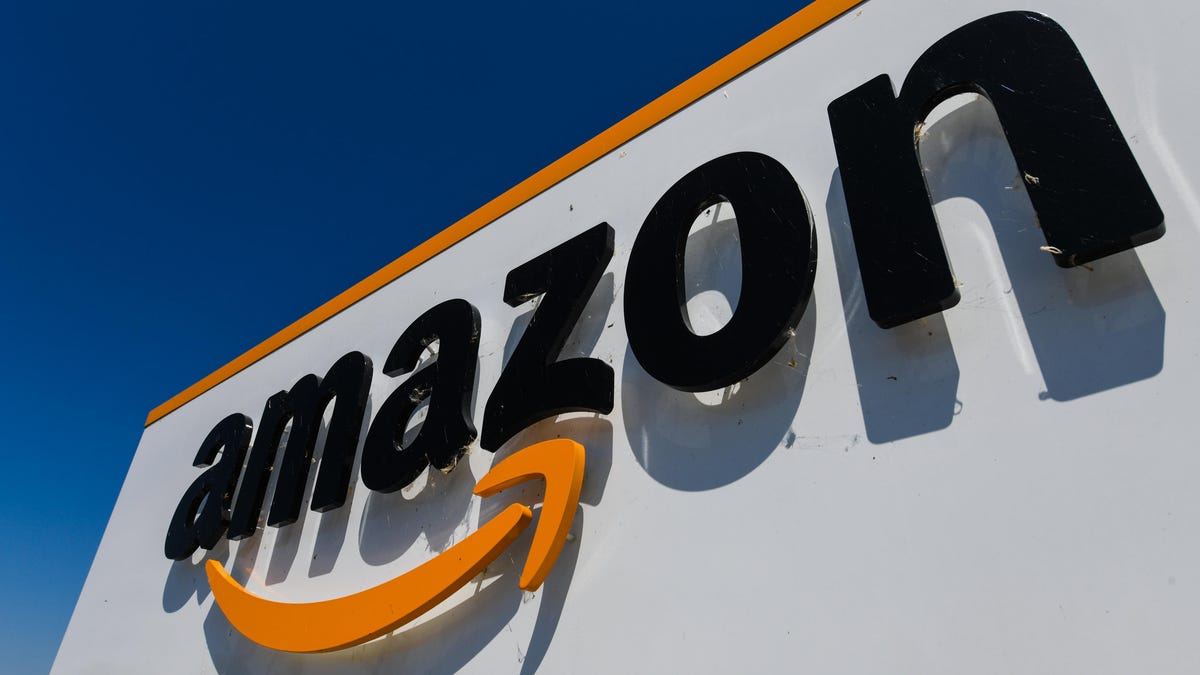Lawmakers grill Amazon, eBay on their problems with counterfeits
The online retailers said they are doing a lot to cut down on fakes.

That's a real Amazon sign.
Recalled baby sleeper seats, counterfeit airbags, fake water filters, knockoff beauty products that cause people's eyelashes to fall out, counterfeit cellphone chargers that can cause fires. Even shoddy children's toys containing strong magnets that if ingested could require surgery to remove.
These and more unsafe products were discussed during a US House of Representatives hearing Wednesday that delved into fake products and fake reviews on major online stores and brought out representatives from Amazon , eBay and Apple .
During the nearly three-hour hearing, many lawmakers directed critical questions at Amazon's representative, Dharmesh Mehta, vice president of worldwide customer trust and partner support. They raised concerns about how the world's largest e-commerce company fights against knockoffs on its sites.
While Mehta said Amazon spent $500 million last year to fight fraud and abuse on its stores and uses a variety of tech tools to monitor millions of sellers and listings, some at the hearing weren't impressed.
"We need to call on all of these platforms to step up," David Friedman, vice president of advocacy at Consumer Reports, told lawmakers. "They are investing effectively pennies when they should be investing dollars in informing consumers, getting these products off their platforms and putting their consumers instead of their profits first."
The hearing was held just two days after a bipartisan group of lawmakers introduced a new bill, called the Shop Safe Act, that would make online retailers like Amazon and eBay legally liable for counterfeits sold on their sites. These companies right now generally avoid such liability for goods sold on their sites by other merchants. The gathering also follows investigations by The Wall Street Journal last year that detailed thousands of problematic product listings on Amazon's site, including infant sleeping mats Amazon itself had banned for danger of suffocation and supplements that contained illegally imported prescription drugs.
The hearing comes at the same time that Washington is dialing up its scrutiny of tech giants, especially investigating potential monopolistic practices suffocating smaller competitors. Lawmakers have also held hearings over the past year and a half on Facebook's controversial foray into cryptocurrency and Google's collection of consumer data.
As is typical, this legislative work is moving slowly and mostly in a phase of data gathering. But there's now far greater potential that Congress could pass more regulations to restrain tech titans' businesses, stop them from making new acquisitions or even break up these huge companies.
At the hearing Wednesday, Jeff Myers, Apple's senior director for intellectual property, said knockoffs of Apple phone chargers and replacement batteries can be dangerous for consumers and erode trust in his company, even though these counterfeits aren't made by Apple.
While his company works to monitor dozens of online sales platforms to take down these listings, he recommended online marketplaces do a better job vetting their sellers to make sure they are legitimate. He added that these platforms need to work more effectively at booting repeat offenders.
Amazon's Mehta and Amber Leavitt, eBay's head of intellectual property, acknowledged that more work needs to be done, but both said they already use many sophisticated technologies to proactively shut down counterfeit listings. Both companies say that the vast majority of listings on their sites are authentic.
For example, Mehta said that Amazon's efforts in 2019 prevented over 2.5 million suspicious accounts from publishing a single product for sale on its sites and blocked over 6 billion suspected bad listings from publishing, too. The company also blocked or suppressed over 100 million suspected fake reviews.
To curtail fake reviews, Mehta called on social media companies like Facebook to do a better job taking down groups on their sites that offer free or deeply discounted products to consumers in exchange for positive reviews.
Many at the hearing called for more resources and staffing at regulators like the Federal Trade Commission to help cut down on counterfeits coming into the US, and several lawmakers pointed the finger directly at China as a hotbed of counterfeiting activity.
Andrew Love, head of brand security for Specialized Bicycles, which doesn't sell on Amazon, raised a common refrain that fighting fakes is a lot like whack-a-mole, with bad actors able to relist items quickly despite efforts to shut them down. With so much stuff now available on so many websites today, he said his job of tracking down fake bikes and helmets has become significantly more difficult than in the early days of e-commerce.
Congressman Frank Pallone Jr., a New Jersey Democrat, said online retailers have done a lot to make shopping more convenient for customers.
"But the problem is this convenience has come at a price," he said, later adding that "consumers and authentic brands cannot fight the combination of lax policies of online platforms and deceptive practices of unscrupulous sellers."

